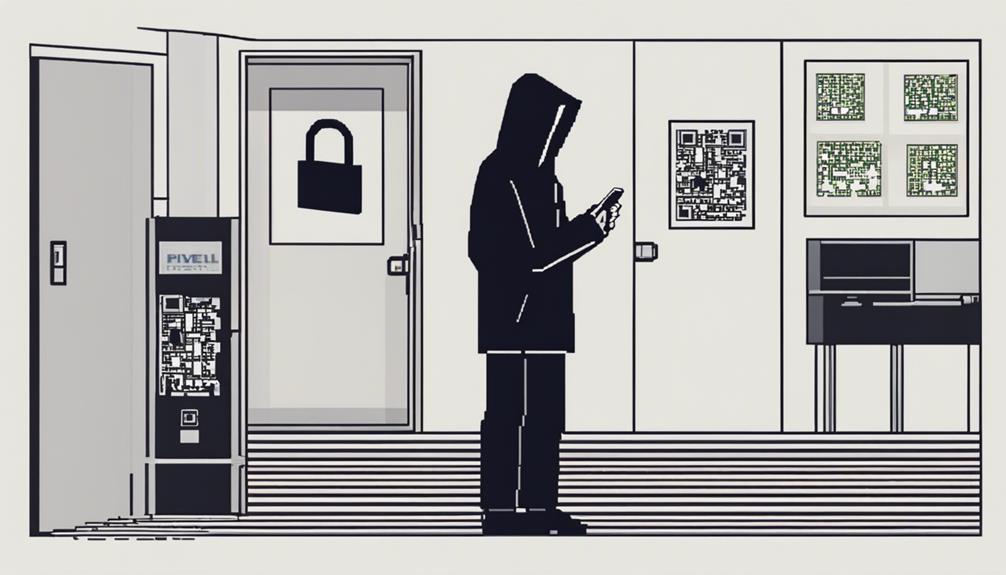Apple phones are not entirely safe from hackers, despite robust security measures like hardware-based encryption and controlled app distribution. Incidents such as Pegasus and AdThief have exposed vulnerabilities in iPhone security. Stay vigilant for signs of hacking such as unexplained battery drain and unusual app behavior. If you suspect your iPhone is compromised, run a malware scan, change passwords, and seek expert guidance. Regular malware scans and software updates, strong passwords, and the use of reputable antivirus software can enhance Apple phone security. Discover more about securing your device against cyber threats by exploring further.
Key Takeaways
- iPhones are not immune to hacking despite security measures.
- Apple's encryption enhances security but vulnerabilities exist.
- Awareness of common hacking methods is crucial for protection.
- Signs of hacking include battery drain and strange app behavior.
- Regular malware scans and security practices bolster iPhone safety.
Iphone Security Myths
The misconception surrounding iPhone security often leads to various myths associated with the device's vulnerability to hacking and malware. Despite common beliefs that iPhones can't be hacked due to iOS security measures and Apple's robust security protocols, the reality is that iPhones are not immune to cyber threats.
While Apple's emphasis on hardware-based encryption and strict control over the App Store does enhance security, it doesn't eliminate the risk entirely. Hackers have successfully breached iPhone security in the past, exposing iOS vulnerabilities and highlighting the fact that even Apple's security measures can be circumvented.
The idea that iPhones are impervious to hacking is a myth, as evidenced by incidents where iPhones have been compromised. The presence of malware like Pegasus and AdThief further challenges the notion of iPhones being completely secure devices. It is essential to understand that while Apple prioritizes security, iPhones are not immune to hacking, and users should remain vigilant against potential threats.
Common Hacking Methods

Amidst the prevailing myths surrounding iPhone security, an important aspect that demands attention is understanding the common hacking methods that pose a threat to Apple phone users. Hackers employ various techniques to compromise the security of iPhones, putting users at risk of data breaches and privacy violations.
Some of the most common hacking methods include:
- Phishing through emails, SMS, phone calls, social media, web ads, and fraudulent software.
- Malicious apps, particularly free ones, that can exploit vulnerabilities in Apple phones.
- Presence of malware or spyware indicated by unusual behavior, high power draw, and unnecessary app permissions.
- Remote hacking through app or iOS operating system vulnerabilities, allowing unauthorized access to personal information stored on the device.
Being aware of these potential threats is essential for Apple phone users to take proactive measures in safeguarding their devices against malicious attacks and unauthorized access to sensitive data.
Signs of Iphone Hacking

Common signs of iPhone hacking can include unexplained battery drain, where the device loses power rapidly without heavy usage.
Strange behavior from apps, such as crashing or freezing unexpectedly, may also indicate a security breach.
If you notice these signs on your iPhone, it's important to investigate further to protect your data and device from potential threats.
Unexplained Battery Drain
Instances of unexplained battery drain on an iPhone can serve as early indicators of potential hacking activities, signaling background processes consuming power without clear justification. Monitoring battery usage through settings can help uncover hidden processes draining power, pointing to potential security breaches or malware.
Sudden and significant battery depletion without increased usage may suggest the presence of malicious software on the device. Hackers exploiting vulnerabilities in apps or the iOS system can cause excessive battery drain to maintain unauthorized access. If your iPhone's battery life decreases rapidly and unexpectedly, it's essential to investigate for possible hacking attempts.
Strange App Behavior
Unusual app behavior on an iPhone can serve as a vital indicator of potential hacking activities, highlighting the need for vigilant monitoring and swift action to safeguard the device's security.
Signs such as frequent crashes, freezing, unexpected pop-up ads, or redirects within apps may suggest malicious activity compromising the device.
Additionally, unauthorized changes in app settings or permissions without user input could signal a security breach. Apps requesting excessive permissions or access to sensitive data without justification might be attempting to exploit the device.
It is essential to monitor and address any abnormal app behavior promptly to prevent further damage from potential hacking incidents.
By staying alert to these red flags and taking immediate action, iPhone users can mitigate the risks associated with unauthorized access and protect their sensitive information from falling into the wrong hands.
Vigilance and proactive measures are key in maintaining the security and integrity of your iPhone.
Dealing With a Compromised Iphone

When faced with a compromised iPhone, it is essential to take immediate steps to secure the device and protect your personal information. Here are some vital actions to contemplate:
- Run a malware scan: Detect and eliminate any malicious software that may have compromised your device.
- Change passwords: Secure your accounts by updating passwords for all linked services to prevent unauthorized access.
- Seek Apple Support: Get expert guidance on how to effectively secure your compromised iPhone.
- Reset to factory settings: Erase all data on the device to remove any security threats that may have been installed post-compromise.
It is also important to remove any unrecognized apps and devices linked to your compromised iPhone to eliminate hidden malware and prevent further unauthorized access.
Additionally, freezing credit and canceling linked credit cards can help prevent identity theft and misuse of financial information. Taking these steps promptly can help mitigate the risks associated with a compromised iPhone.
Running a Malware Scan

Performing a malware scan on your Apple phone is essential to safeguarding your device from potential security threats.
Regular scans can help you detect and remove any harmful software that may compromise your phone's safety.
It is recommended to run malware scans frequently to guarantee your device remains protected against hackers.
Malware Scan Importance
Regularly conducting a malware scan on your iPhone is essential for maintaining its security and protecting against potential threats. Malware scans play a vital role in safeguarding your iPhone from hidden malware, malicious software, and unauthorized access that could result in data breaches. Here are key reasons why malware scans are important:
- Detect and remove hidden malware that may compromise iPhone security.
- Identify and eliminate malicious software to prevent unauthorized access and data breaches.
- Guarantee your iPhone remains secure against hacking attempts.
- Remove suspicious apps or files that could jeopardize personal information.
To enhance your iPhone's security, it is recommended to use reputable antivirus software with malware scanning capabilities. By implementing regular malware scans, you can proactively protect your device and sensitive data from cyber threats.
Recommended Scan Frequency
Performing malware scans on your iPhone at least once a week is important to guarantee the continuous detection and removal of potential threats to your device's security. Regular scans help in identifying and eliminating any malicious software that might have breached your iPhone.
Utilizing reputable antivirus software such as TotalAV for these scans ensures thorough protection against evolving cyber threats. Consistent scanning is vital to maintaining your iPhone's security and safeguarding it from hackers.
By incorporating a weekly malware scan routine, you greatly reduce the risk of falling victim to cyber attacks or data breaches. Keeping your device free from malware through these scans is an essential step in preserving the integrity of your personal information and ensuring a smooth user experience on your iPhone.
Stay proactive in defending your device by prioritizing the weekly malware scan to fortify your iPhone against potential security threats.
Preventive Measures

To enhance the security of your Apple phone, implementing proactive measures is essential. Here are some key security measures to protect your device:
- Keep iOS and apps updated: Regular updates from Apple help patch vulnerabilities that hackers could exploit.
- Use strong passwords: Secure your device with complex passwords and enable two-factor authentication for an added layer of protection.
- Install reputable antivirus software: Antivirus programs can detect and remove malware, enhancing your device's security against cyber threats.
- Utilize VPNs on public Wi-Fi: When connecting to public Wi-Fi networks, use a Virtual Private Network (VPN) to encrypt your data and prevent hackers from intercepting sensitive information.
Best Iphone Apps for Security

Enhancing the security of your iPhone involves utilizing top-rated security apps to safeguard your device and sensitive information effectively. For iOS operating system users, incorporating secure apps like LastPass and Authy can enhance password management and provide two-factor authentication for an additional layer of security.
Lookout Mobile Security is a valuable tool that offers protection against malware and phishing attempts, shielding iPhones from potential cyber threats.
Additionally, utilizing the Signal app for encrypted messaging guarantees secure communication, while VPN apps such as NordVPN and ExpressVPN encrypt internet traffic, enhancing privacy and security when browsing online.
For thorough protection against various cyber threats, Norton Mobile Security is a recommended choice for iPhone users. By implementing these security measures and apps, iPhone users can strengthen their device's security and safeguard their sensitive data effectively.
How Iphones Get Hacked

Hackers can compromise iPhones by exploiting vulnerabilities in apps or the iOS operating system, enabling them to obtain sensitive information. Common methods used by hackers include tricking users into downloading malware or disclosing personal details.
Phishing, through various channels like emails, SMS, and fake software downloads, remains a prevalent tactic for hacking iPhones.
Common Hacking Methods
One of the primary ways iPhones can be compromised by unauthorized individuals is through common hacking methods that exploit vulnerabilities in apps or the iOS operating system.
- Unauthorized apps: Installing unauthorized apps directly from sources outside the App Store can lead to sharing sensitive and valuable information.
- Phishing tactics: Hackers often use emails, SMS, phone calls, and social media to trick users into sharing personal data that can be used to hack iPhones.
- Malicious apps: Free apps, in particular, can compromise user data, making iPhones vulnerable to being hacked.
- Unusual behavior: Detecting high power consumption, unnecessary app permissions, or any suspicious activities on your device may indicate the presence of malware or spyware.
Vulnerabilities in Ios
Exploiting vulnerabilities within the iOS operating system serves as a key avenue for hackers seeking to compromise the security of iPhones. These vulnerabilities, often stemming from loopholes in the operating system or apps, can be exploited through various methods such as phishing, malware, malicious apps, and spyware. Hackers may trick users into downloading malware or gain unauthorized access through phishing techniques like fraudulent emails, SMS, or social media messages. Malicious apps, particularly free ones, pose a significant risk by compromising user data once installed on the device. To detect potential compromises, users should be vigilant for signs of unusual behavior, high power consumption, or unnecessary app permissions on their iPhones.
| Vulnerabilities in iOS | Common Methods of Exploitation |
|---|---|
| Loopholes in the OS | Phishing through various means |
| Malicious Apps | Trickery and malware downloads |
| Spyware | Unauthorized access to data |
Preventing Iphone Hacking

To enhance the security of your iPhone and protect it from potential hacking threats, implementing proactive measures is essential.
Here are some key steps to prevent iPhone hacking:
- Keep iOS and apps updated: Regular updates from Apple include security patches that help protect against vulnerabilities.
- Enable two-factor authentication: Adding this extra layer of security can prevent unauthorized access to your Apple and iCloud accounts.
- Use strong passwords: Creating unique and robust passwords helps safeguard your device and accounts from hacking attempts.
- Install reputable antivirus software: Having trusted antivirus software can help detect and remove any malicious software that may compromise your iPhone's security.
Remember to be cautious with downloads and avoid clicking on suspicious links to prevent malware from infiltrating your device. By staying vigilant and consistently updating your device, you can greatly reduce the risk of falling victim to iPhone hacking.
Responding to a Hack

In the event of a potential security breach or hack on your Apple phone, prompt actions can mitigate the impact and safeguard your device and personal information.
First and foremost, disconnect from the internet to prevent further unauthorized access.
Next, change all associated passwords and update your device's security settings.
Consider installing reputable antivirus software for added protection.
If you suspect a hack, contact your service provider or seek professional help promptly.
As a last resort, a factory reset can eliminate potential security threats from your compromised device.
These steps are essential in responding effectively to a hack on your Apple phone. By taking swift and decisive action, you can secure your device and personal data from further harm.
Frequently Asked Questions
How Secure Is an Iphone From Hackers?
iPhones exhibit robust security features with hardware encryption and stringent App Store regulations. Apple's timely updates bolster defense against cyber threats. However, past vulnerabilities and malware incidents suggest that iPhones remain susceptible to targeted attacks, requiring continuous vigilance.
Can Hackers See You Through Your Iphone?
Peeping Tom's eye may not pierce through your iPhone's lens, but hackers can exploit vulnerabilities to invade your digital privacy. Vigilance and robust security measures are the shields against prying cyber eyes.
What Are the Security Risks of Iphone?
The security risks of iPhone include susceptibility to hacking methods such as phishing, malware, and remote exploits. Signs of a hacked iPhone include overheating, battery drain, and unusual activity. Vigilance, updates, and strong security measures mitigate risks.
Can I Tell if My Iphone Has Been Hacked?
Detecting potential compromises on an iPhone can be indicated by irregularities such as unusual battery performance, unauthorized messages or calls, data spikes, unfamiliar apps, or erratic behavior. Regular vigilance helps safeguard against potential hacks.
Conclusion
To sum up, safeguarding your iPhone from hackers requires vigilance and proactive measures. Just as a vigilant guard protects a castle from intruders, staying informed about common hacking methods, running malware scans, and using secure apps are key in protecting your device.
By understanding how iPhones can be compromised and taking steps to prevent hacking, you can guarantee the safety of your personal information and data.









